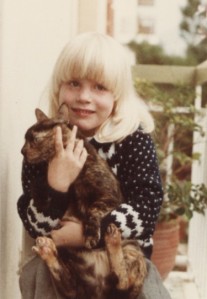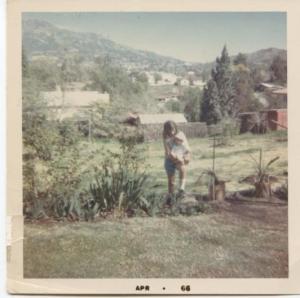I always was interested in being a writer, having actually begun to scribble down stories and adventurous narrations from when I was in the seventh grade, or shortly thereafter. Junior High school was deadly, and most of my peers were loathsome enough that taking that particular refuge in imagination was a perfectly sensible response for someone whose nose was buried in a book very nearly twenty-four seven anyway. I liked to read stories, and I liked write them, and to think up stories and tell them to people… especially to my little brother Sander, who was a perfect mark for some of my best. Such as the one I told him, when we were at the beach, when he was about five years old; there was a factory or a power plant away down the coast, with the towers and chimneys just barely visible. I told him that it was a factory for making soap; that it sucked in all the white foam off the waves that were breaking all along the beach in front of us, and transformed it into soap and detergent.
Then there was the one for my toddler-aged daughter, Blondie, when she lost a helium-filled balloon. As it floated away, I told her about the Secret and Mystical Island of Balloons, away off in the middle of the Pacific. It was the natural home for all balloons, and they headed there as soon as they escaped from children who had let go of their strings. They even, I assured her, had daring and highly-trained squads who ran special rescue missions to retrieve the remains of popped balloons from wastebaskets the world over, and revive them, once they were safe on the Mystical Island of Balloons. 
Then there was the time she was frightened by the original Gremlins movie; she insisted there were gremlins under her bed. Heck, I had once heard leprechauns under mine. (“How did you know they were leprechauns?” asked my mother, when she found me sleeping in the closet the next morning. I had curled up there for some peace and quiet; the leprechauns were very rackety. “Because they were little enough to be under my bed, and they sounded like Grandpa Jim, “ I told her; always logical. ) I assured my daughter that she was safe from gremlins as long as our cats, Patchie and Bagheera, were sleeping on her bed; it was a little known fact that cats were absolute death on gremlins.
One of the hundreds of reasons I love small children, they are so gullible.
The trouble with going straight into writing became clear to me along about the time that I went into college for that amusingly useless degree in English. A couple of things gradually made themselves clear to my young and wide-eyed self. One of them was that only a very few of the duly and properly anointed works of Great Modern English Literature written after about 1930 did not bore me into a coma. Seriously: the reading list for a course in the Modern Novel was enough to make me want to slash my wrists – that depressing. Secondly, I realized that of the writers I did enjoy, both ancient and modern… most of them had done something else! They had done something else, seriously and with varying degrees of success before picking up the old goose quill and writing. (Classic quip about trying to earn a living as a writer: “It’s like hooking. Before you start charging for it, better be sure you’re pretty good.) Just look at the list: Chaucer— diplomat and courtier. Shakespeare — actor and theatrical manager. Dickens — newspaper and magazine writer. Kipling — reporter. Mark Twain — reporter. HH Monro— ok, so he was a man about town and wrote on the side. Sir Walter Scott — lawyer. Robert Lewis Stevenson — trained as a lawyer, worked as a travel writer. Thackeray — journalist and editor. Even the modern popular writers that I liked most had done something else for a bit. . James Jones —- soldier. Raymond Chandler — oil bidness. Dorothy Sayers pottered around in advertising, and so did Peter Mayle of Provence fame. Carl Hiaasen — newspaper reporter. Hemmingway — well, he squeezed in some reporting. Joseph Wambaugh — policeman. James Herriot spun a career as a veterinarian into four books plus. Only JRR Tolkein camped serenely in the academic utopia for most of his writing life, but he had served in World War I.
There were some exceptions either way, of course, but those works of literature, most especially the modern writers anointed by the academe seemed . . . Well, pretty juiceless. Enervating. Arid. Given over to navel-gazing, and the weaving of elaborate language with nothing much to say. Even those few who did attempt something more in a novel than a dry exercise in special language effects seemed to look at real life, and real people as if they were something faintly exotic, carefully placed in a natural setting in a zoo and seen through a plate glass window. It almost seemed as if doing something else, anything else for a while filled a writer up with people, experiences, scraps of odd conversation and occurrences . . . filled them up with life and energy, and that was the kind of writer I wanted to be.
Besides, getting a life looked like being a lot more fun than hanging around for post-graduate studies.


mom it was werewolves (from Micheal Jacksons Thriller video) and it was my closet